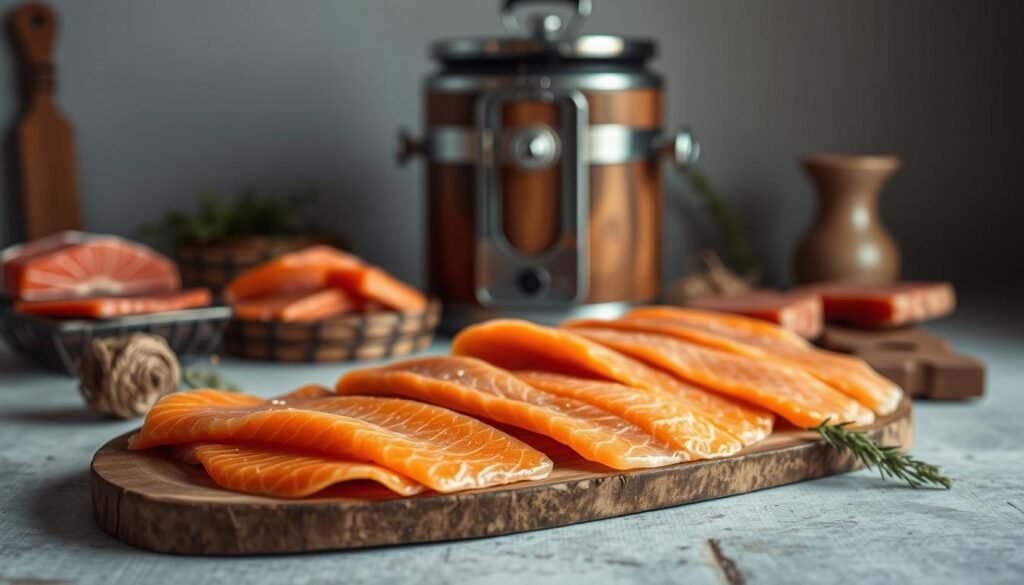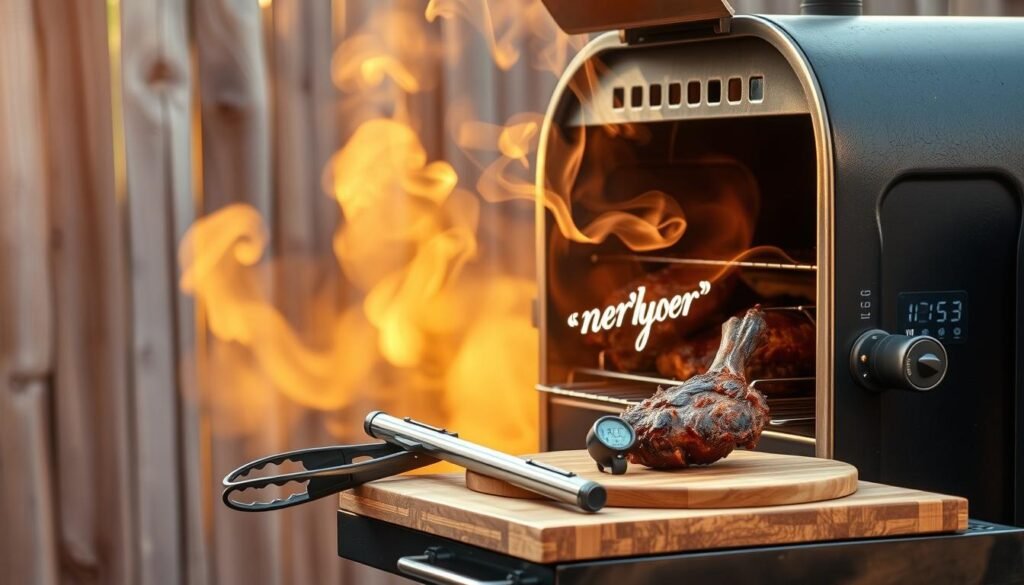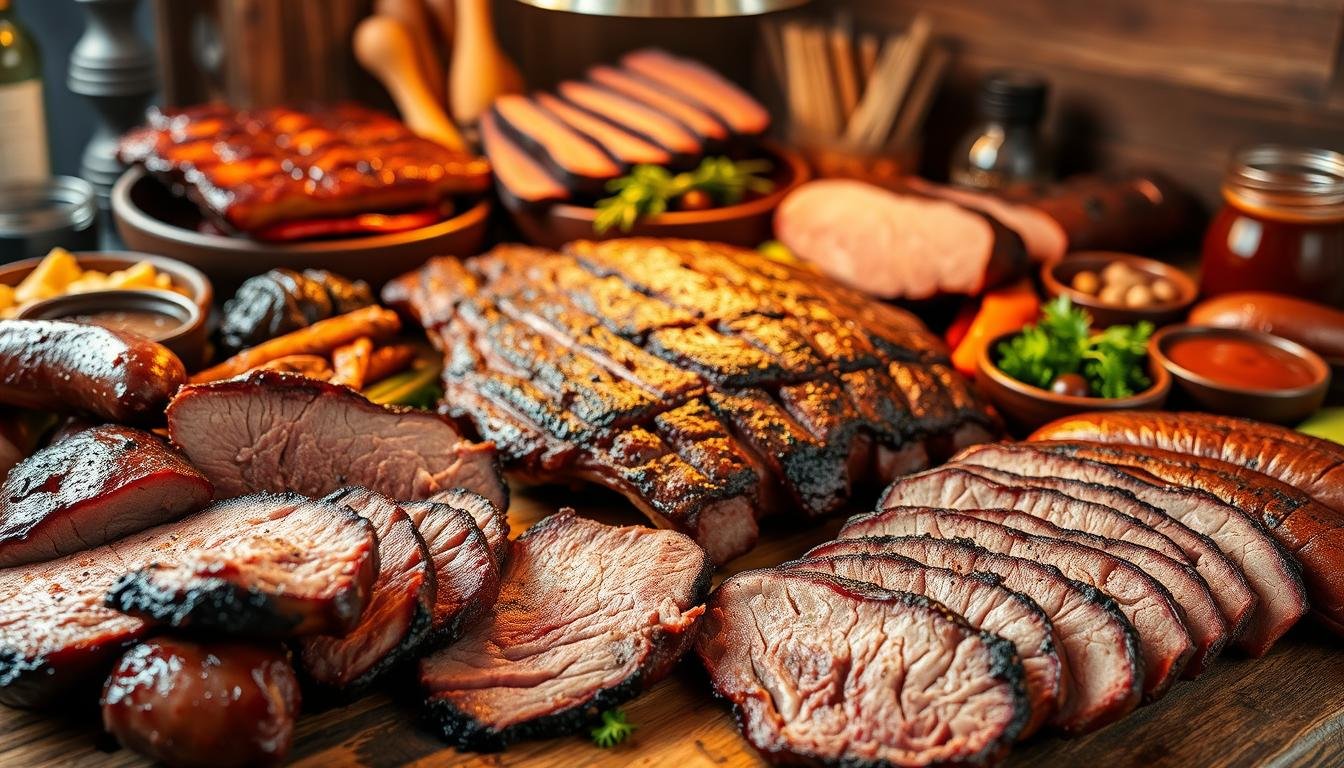The smell of wood chips and sizzling meat opens up a world of flavors. It’s not just cooking; it’s a passion that turns simple ingredients into unforgettable dishes. Whether it’s for a backyard party or a BBQ competition, smoked meat is more than a technique.
These top smoked meat recipes will take your BBQ to the next level. You’ll learn how to make dishes that taste like they came from a restaurant. With these techniques, even the simplest cuts can become a feast for the senses.
Smoking meat is an art that needs patience, skill, and a good sense of flavors. This guide will show you how to make everything from classic smoked brisket to new twists on old favorites. You’ll become a pro at smoking meat in no time.
- Understanding the Art of Smoking Meat
- Best Smoked Meat Recipes for Beginners
- Mastering Smoked Brisket and Ribs
- Poultry Smoking Techniques
- Best Smoked Meat Recipes That Will Impress
- Seafood Smoking Secrets
- Essential Rubs and Marinades
- Temperature Control and Timing Guidelines
- Conclusion
- FAQ
- What type of smoker is best for beginners?
- How long does it take to smoke different types of meat?
- What are the best woods for smoking different meats?
- How do I prevent my smoked meat from drying out?
- What internal temperature should I aim for when smoking meat?
- Can I smoke frozen meat?
- How do I create a good bark on smoked meats?
- What's the difference between hot and cold smoking?
- How long can I store smoked meats?
- Can I use a gas grill for smoking?
- Source Links
Understanding the Art of Smoking Meat
Smoking meat turns simple cuts into amazing dishes. Whether you’re into smoked pork or ribs, knowing the basics is key. It helps make meals that wow your guests.
Smoking meat needs patience, skill, and the right tools. The best temperature is between 225°F and 250°F. Cooking times vary based on the meat type and cut. Beginners often start with pork shoulder, which cooks well without drying out.
Types of Smokers and Their Benefits
Different smokers bring unique benefits to your cooking:
- Charcoal Smokers: Give a traditional smoky taste
- Electric Smokers: Keep the temperature steady
- Pellet Grills: Mix ease with real wood-fired flavor
- Offset Smokers: Great for those who love hands-on cooking
Essential Tools for Smoking Meat
To improve your smoking, get these key tools:
- Digital meat thermometer
- Quality meat injector
- Sturdy meat tongs
- Heat-resistant gloves
- Drip pans for catching juices
Choosing the Right Wood for Smoking
Wood choice greatly affects flavor. For smoked pork, try these woods:
- Hickory: Strong, bold flavor for pork and beef
- Apple: Mild, sweet taste for lighter meats
- Mesquite: Intense flavor, use sparingly
- Pecan: Rich, nutty taste for most meats
Pro tip: Thin blue smoke means you’re smoking right. Thick white smoke can make flavors bitter. Try different woods to find your favorite for smoked ribs.
Best Smoked Meat Recipes for Beginners
Starting with smoked meat recipes might seem scary, but it’s easy with the right help. These recipes are great for beginners who want to try barbecue.
Here are some easy recipes to get you started:
- Smoked Chicken: A great choice for beginners. Food & Wine recommends spatchcocking the chicken for even cooking. Use a simple dry rub with garlic, onion, cumin, and brown sugar.
- Pulled Pork: Perfect for feeding a lot of people and improving your smoking skills
- Smoked Pork Ribs: Great for learning about temperature control and patience
For beginners, start with chicken thighs or drumsticks. These are easy to work with and take 1.5 to 2 hours to smoke. The secret to success is keeping the temperature steady and letting the flavors soak in.
Here are some tips for beginners:
- Choose quality meat cuts
- Invest in a reliable meat thermometer
- Try different wood chips for unique flavors
- Practice patience and low-and-slow cooking
Whether you’re into smoked chicken or other meats, start simple. Remember, every great pitmaster started where you are now. They were eager to learn and make tasty smoked dishes.
Mastering Smoked Brisket and Ribs
Smoking meat is an art that needs patience, skill, and knowledge. We’ll explore two BBQ favorites: brisket and ribs. These recipes will help you improve your BBQ skills, whether you’re a backyard expert or a weekend griller.
Texas-Style Smoked Beef Brisket Tips
To make perfect Texas-style brisket, start with the right cut. Choose a Prime or Choice grade brisket with good marbling. Here are some tips for your brisket recipes:
- Trim the fat cap to about 1/4 inch thickness
- Use a simple salt and pepper rub
- Smoke at 225-275°F for 12-14 hours
- Target internal temperature of 203°F
- Rest the brisket in an insulated cooler for 1-2 hours
3-2-1 Method for Perfect Ribs
The 3-2-1 method is a sure way to get tender, fall-off-the-bone ribs. Here’s how it works:
- Smoke ribs for 3 hours at 225-250°F
- Wrap in foil and cook for 2 hours
- Unwrap and finish for 1 hour to crisp the exterior
Creating the Perfect Bark
The bark is the ultimate goal of smoked meats. To get a rich, flavorful crust:
- Use a blend of oak and hickory wood chunks
- Apply a generous dry rub with brown sugar and spices
- Maintain consistent smoker temperature
- Allow sufficient time for the bark to develop
Pro tip: The secret to great BBQ is patience. Take your time, keep an eye on temperatures, and don’t rush it.
Poultry Smoking Techniques
Smoking poultry needs precision and skill. It turns ordinary birds into delicious treats. Knowing the right techniques is key.
- Choose fresh, high-quality birds weighing 4-5 pounds
- Brine for 24 hours to enhance moisture and flavor
- Use indirect heat for consistent cooking
- Maintain smoker temperature around 250 degrees F
Smoking times depend on the bird’s size. A whole chicken takes about 3-5 hours or 45 minutes per pound. It’s important to reach 165 degrees F for safety.
| Nutritional Content | Per Serving |
|---|---|
| Calories | 312 kcal |
| Protein | 26g |
| Fat | 16g |
| Cholesterol | 108mg |
For crispy skin, pat the chicken dry before seasoning. Pro tip: Use the traditional Dalmatian rub of salt and pepper for authentic flavor. A probe thermometer helps check doneness without opening the smoker too often.
Let your smoked chicken rest for 20 minutes after cooking. This allows juices to spread, making it tender and flavorful. Your smoked chicken recipes will surely impress.
Best Smoked Meat Recipes That Will Impress
Take your barbecue to the next level with these amazing smoked meat recipes. They’re perfect for impressing your guests. Whether you’re an expert or just starting, these recipes will show off your cooking skills.
Smoking meat is an art that needs patience, skill, and a love for flavor. These recipes will help you become a master at making delicious dishes. They’re sure to wow your guests.
Smoked Prime Rib Recipe: The Ultimate Reverse Sear
Make a prime rib that rivals restaurant quality with the reverse sear method. This method gives you a crispy outside and a juicy inside. You’ll need:
- High-quality prime rib roast
- Kosher salt
- Coarse black pepper
- Garlic powder
- Smoker or grill with temperature control
Bourbon-Glazed Smoked Ham: A Holiday Showstopper
Turn your ham into a showstopper with a bourbon glaze. The glaze caramelizes beautifully, adding sweet, smoky, and rich flavors. It’s a dish you’ll remember.
Competition-Style Pulled Pork: Pitmaster Secrets Revealed
Learn how to make tender pulled pork like the pros. From choosing the right cut to perfecting the bark and moisture, these recipes will boost your barbecue skills.
“The key to great barbecue is patience and passion.” – Legendary Pitmaster
These recipes are the best of smoked meat, blending tradition with new flavors. They’ll make your cooking unforgettable.
Seafood Smoking Secrets

Smoking seafood turns regular fish into amazing dishes. Smoked salmon recipes are a mix of taste and skill. They need careful attention and knowledge of smoking methods.
There are two main ways to smoke seafood: hot and cold. Hot-smoked salmon cooks at 225°F, making it fully cooked and flaky. Cold-smoked salmon cooks at about 90°F, keeping it silky and raw-like.
- Hot-smoking reaches internal temperatures of 120-125°F
- Cold-smoking maintains temperatures below 90°F
- Brining time typically ranges from 5-10 hours
Picking the right salmon is key. Farm-raised Atlantic salmon is high in fat, perfect for smoking. Wild king salmon has rich flavor, and sockeye salmon is leaner but still great for smoking.
| Salmon Type | Fat Content | Smoking Suitability |
|---|---|---|
| Atlantic (Farm-raised) | High | Excellent |
| Wild King | High | Exceptional |
| Sockeye | Lower | Good |
When making smoked salmon, pick your wood chips wisely. Alder, apple, and cherry woods add subtle flavors that boost the seafood’s taste. Keep the temperature steady and let it dry well before smoking.
The secret to perfect smoked salmon lies in patience and precision.
Always keep safety first. Make sure seafood hits 145°F to avoid food poisoning. With time, you’ll get the hang of turning fresh fish into tasty smoked treats.
Essential Rubs and Marinades
Turning simple meats into amazing dishes starts with the right rubs and marinades. Whether you’re making smoked sausage or jerky, learning these tricks will boost your smoking skills.
Knowing how to season is key for delicious smoked meats. Use 2 tablespoons of rub for every 1½ pounds of meat. The right seasoning can change the taste and texture of your dish.
Dry Rub Combinations
Making a great dry rub is all about mixing flavors right. Here’s a basic BBQ rub mix:
- ½ cup paprika
- ¼ cup kosher salt
- ¼ cup chili powder
- ¼ cup ground cumin
- 2 tablespoons black pepper
- 1 tablespoon brown sugar
Wet Marinade Secrets
Wet marinades add deep flavors to meat. Pro tip: Marinate in the fridge for at least 1 hour but no more than 24 hours to avoid meat damage.
Brine Solutions for Different Meats
Brining keeps meat moist and flavorful. A basic brine has water, salt, and sometimes sugar. Try adding herbs and spices to make it special for different meats.
Most dry rubs can last up to 6 months in airtight containers. Keep your spices fresh for the best smoking results!
Temperature Control and Timing Guidelines

Mastering temperature control is key to making the best smoked meat. Your smoker’s performance depends on managing heat and airflow well. Two main vents, intake and outtake dampers, help you control the temperature.
Knowing how to use vent control is crucial. Here’s what you need to know:
- Opening the intake vent increases temperature
- Closing the intake vent reduces heat
- More airflow creates a hotter fire
- Restricted airflow results in cooler temperatures
Pro tip: Fully open both vents initially to establish a baseline temperature before fine-tuning.
Different meats need specific temperatures for the best results. Here are some recommended smoking temperatures:
| Meat Type | Smoking Temp | Internal Temp |
|---|---|---|
| Beef Brisket | 225-275°F | 190-210°F |
| Pork Ribs | 225-275°F | 195-205°F |
| Chicken | 250-300°F | 165°F |
“Proper vent control can mean the difference between a perfect brisket and a disappointing meal.”
Remember, keeping your smoker’s vents clean and well-lubricated is vital. This prevents uncontrolled airflow and temperature changes. A well-maintained smoker is your secret to making delicious smoked meat every time.
Conclusion
Your journey into the world of best smoked meat recipes is just starting. Smoking meat is more than just cooking—it’s a journey that turns simple cuts into amazing meals. You’ll get to try everything from tender brisket to juicy ribs, each one a chance to explore new flavors and be creative.
SmokedBBQSource says to keep trying new things. The best part of smoking meat is how flexible it is. You can try using hickory wood for a classic Texas-style brisket or make your own dry rub with special spices. Every time you smoke, you get to improve your skills and find your own style.
As you keep trying new recipes, remember that getting better takes time. The skills you learn, like controlling temperature and choosing the right wood, will become easy. Your backyard barbecues will become special events where everyone loves your smoked creations.
So, keep going, trust your taste, and always try new things. The world of smoked meats is full of traditions and endless possibilities. It’s waiting for you to leave your mark.
FAQ
What type of smoker is best for beginners?
How long does it take to smoke different types of meat?
What are the best woods for smoking different meats?
How do I prevent my smoked meat from drying out?
What internal temperature should I aim for when smoking meat?
Can I smoke frozen meat?
How do I create a good bark on smoked meats?
What’s the difference between hot and cold smoking?
How long can I store smoked meats?
Can I use a gas grill for smoking?
Source Links
- 43 Best Smoker Recipes To Try: Beef, Pork, Lamb, Chicken + More – https://www.smokedbbqsource.com/best-smoker-recipes/
- 15 Next-Level Smoked Food Recipes to Try – https://www.foodandwine.com/smoker-recipes-6404676
- How to Smoke Meats Like a Pro: Beginner-Friendly Tips for Delicious Cookout — Rasheed Philips – The Gentleman Smoker – https://www.rasheedphilips.com/blog/how-to-smoke-meats-like-a-pro-beginner-friendly-tips
- 1 Hour Smoker Recipes | Chiasson Smoke – https://www.chiassonsmoke.com/blog/1-hour-smoker-recipes?srsltid=AfmBOoqGiawp0jwIu5gykwBwkjy5mfrQOLvIy8RtjJH97Y-YyXEPdtHk
- Best Meats to Smoke – Hey Grill, Hey – https://heygrillhey.com/best-meats-to-smoke/
- 1 Hour Smoker Recipes | Chiasson Smoke – https://www.chiassonsmoke.com/blog/1-hour-smoker-recipes?srsltid=AfmBOoq5z1fe4-YmnQD-6Um_2eYDHEKk-uptbKZPdYE351F7ig_yXLns
- Perfect Smoked Brisket Recipe (on a Traeger!) – Oh Sweet Basil – https://ohsweetbasil.com/perfect-smoked-beef-brisket-recipe/
- Basic 101 Secrets to Smoking the Perfect Ribs and Brisket – Butcher – https://butcherbbq.com/blogs/news/secrets-to-smoking-the-perfect-ribs-and-brisket?srsltid=AfmBOoprZ1Vzqzd1WzOctbOHln8IsHm8IisXxiPL89ikuCdfLVnYQ86m
- Brisket: How to Master the Ultimate BBQ Challenge – https://barbecuebible.com/2024/05/29/brisket-how-to-master-the-ultimate-bbq-challenge/
- Smoked Chicken Recipe – https://www.dinneratthezoo.com/smoked-chicken-recipe/
- Make Smoked Chicken Worthy of the Best BBQ Joints at Home | America’s Test Kitchen – https://www.americastestkitchen.com/articles/8198-make-smoked-chicken-worthy-of-the-best-bbq-joints-at-home
- 8 Smoked BBQ Recipes That Would Make Any Pitmaster Proud – https://www.southernliving.com/food/how-to/smoker-barbecue-recipes?srsltid=AfmBOorJKUA55pfbQX5XqKMqF2ccH_wqv9XlC-kOJpDcbIWVdDNaNKlM
- 24 of Our Best Barbecue Recipes for Smoky-Sweet Meals – https://www.foodandwine.com/cooking-techniques/barbeque/barbecue-recipes-master
- How to Smoke Salmon at Home – https://www.seriouseats.com/how-to-smoke-salmon-recipe-8621746
- How to Smoke Seafood – https://www.alaskankingcrab.com/blogs/resources/how-to-smoke-seafood
- Smoking Secrets: A Step-by-Step Guide to Smoking Meats at Home – https://www.theflyingbutcher.com/blog/smoking-secrets-a-step-by-step-guide-to-smoking-meats-at-home
- 13 BBQ Rub Recipes That Will Make Any Meat Taste Amazing – https://www.bhg.com/recipes/grilling/marinades-rubs/bbq-rub-recipes/
- Ultimate BBQ Pork Rub Recipe – https://www.vindulge.com/ultimate-homemade-dry-rub/
- Mastering Your Smoker’s Vents for Temperature Control – Butcher BBQ – https://butcherbbq.com/blogs/news/mastering-your-smokers-vents-for-temperature-control?srsltid=AfmBOooLFmvjPeZJclST-nVh8-wpqn0IB4J7oBfrrapXtUrOm_bOQtN7
- Perfect Temp Smoked Baby Back Ribs: A Thermal Exploration – https://blog.thermoworks.com/pork/perfect-temp-smoked-baby-back-ribs-a-thermal-exploration/
- How to Smoke Meat – https://www.webstaurantstore.com/article/658/meat-smoking-guide.html?srsltid=AfmBOooyjO9OrqXyZZYG4iK22socnLAtpDmPlss63HVt11rwcZ4u6bx8
- Perfect Smoked Baby Back Ribs Recipe with Bourbon BBQ Sauce – https://buythermopro.com/perfect-smoked-baby-back-ribs-recipe/?srsltid=AfmBOooXCb0I7ynZ8h8OC91muxZFebuNoz5_WUr72TQP7ctRn-OszP28
- Recipe: Mastering the Art of Texas Style Brisket at Home – Butcher BBQ – https://butcherbbq.com/blogs/news/recipe-mastering-the-art-of-texas-style-brisket-at-home?srsltid=AfmBOoo7JROWrMsk1EQrvqDshis3FLHk2jmZzYE3d2lx8ZiYxIJETbmH
- The best brisket recipe: How to smoke a brisket like a Pro – https://bepbbq.com/en/the-best-brisket-recipe-how-to-smoke-a-brisket-like-a-pro/

